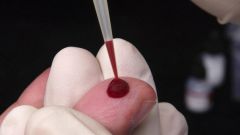What tests are performed before blood
At regional station of blood transfusion potential donor take a blood test to determine the group and RH factor, syphilis, HIV, hepatitis b and hepatitis C, ALT and AST (transaminase). Also is the General analysis of blood to determine hemoglobin levels, white blood cell count, erythrocyte indices, erythrocyte sedimentation rate and RBE. In advance to prepare for the donation of blood, passing these tests in other laboratories, is not necessary. Laboratory transfusion stations always have the best and most accurate equipment in the city, so the stations staff trust only the results of the analyses performed with them.
Testing of blood samples takes about 15-30 minutes. The test results give out, usually on the day of blood donation or the next day.
What is a contraindication for blood donation
The decision on the admission of a person to donate their blood taken by the doctor-transfuziolog. In addition to testing of blood, referred to above, the prospective donor must fill out a questionnaire, which included questions about health status. There is a list of absolute contraindications, in which donation is possible and the time at which the access to blood is limited to a certain period of time. The survey must be made in writing and does not require a potential donor to provide any references, evidence of the presence or absence of certain diseases.
Absolute contraindications to blood donation include:
- tuberculosis in any form;
- brucellosis;
- fever;
- tularemia;
- leprosy;
- hydatid cyst;
- toxoplasmosis;
- Trypanosomosis;
- filariasis;
- Rishta;
- leishmaniasis;
- various malignant tumors;
- diseases of the blood;
- severe congenital diseases of the Central nervous system;
- hearing loss and speech;
- psychiatric illness;
- dependence on alcohol and drugs;
- hypertension, ischemia;
- arteriosclerosis and cardiosclerosis;
- obliterating endarteriit;
- nonspecific aortoarteritis;
- recurrent thrombophlebitis;
heart disease;
- asthma;
- emphysema;
erosive or obstructive bronchitis;
- ulcer of stomach and duodenum;
- liver disease, including toxic poisoning, cirrhosis of the liver;
- diffuse diseases of connective tissue;
- radiation sickness;
- endocrine diseases in which disturbed metabolism;
- ozena;
- acute and chronic ENT diseases;
- uveitis in the residual stage;
- myopia eye greater than 6 diopters;
- blindness;
inflammatory or infectious skin diseases, psoriasis, eczema, sycosis, dermatitis, vesicular dermatitis, fungus;
- osteomielit in acute or chronic form;
- the presence of cavitary operations for the transplantation of internal organs or their resection.
Temporary diversion have citizens who have during the month been recorded acute respiratory disease, or SARS, was introduced vaccine, produced by removing the tooth or surgery. You can donate blood no earlier than one month after birth, and after tattooing or body piercing.

